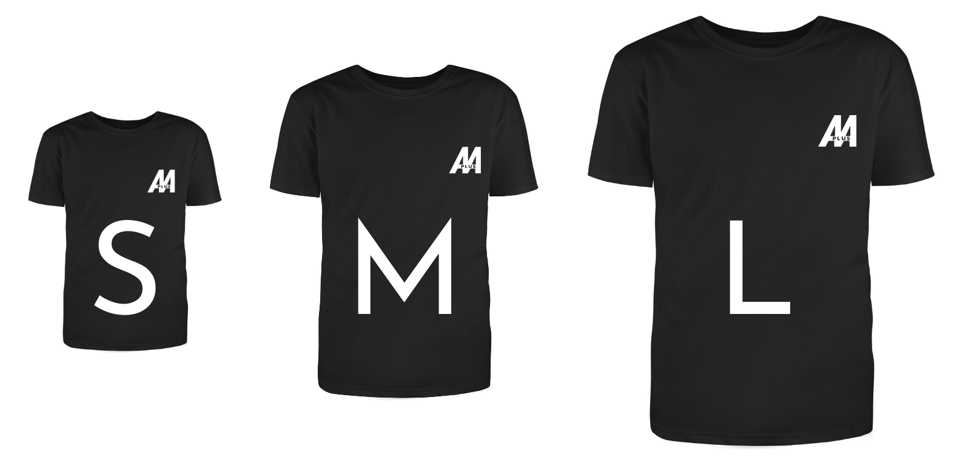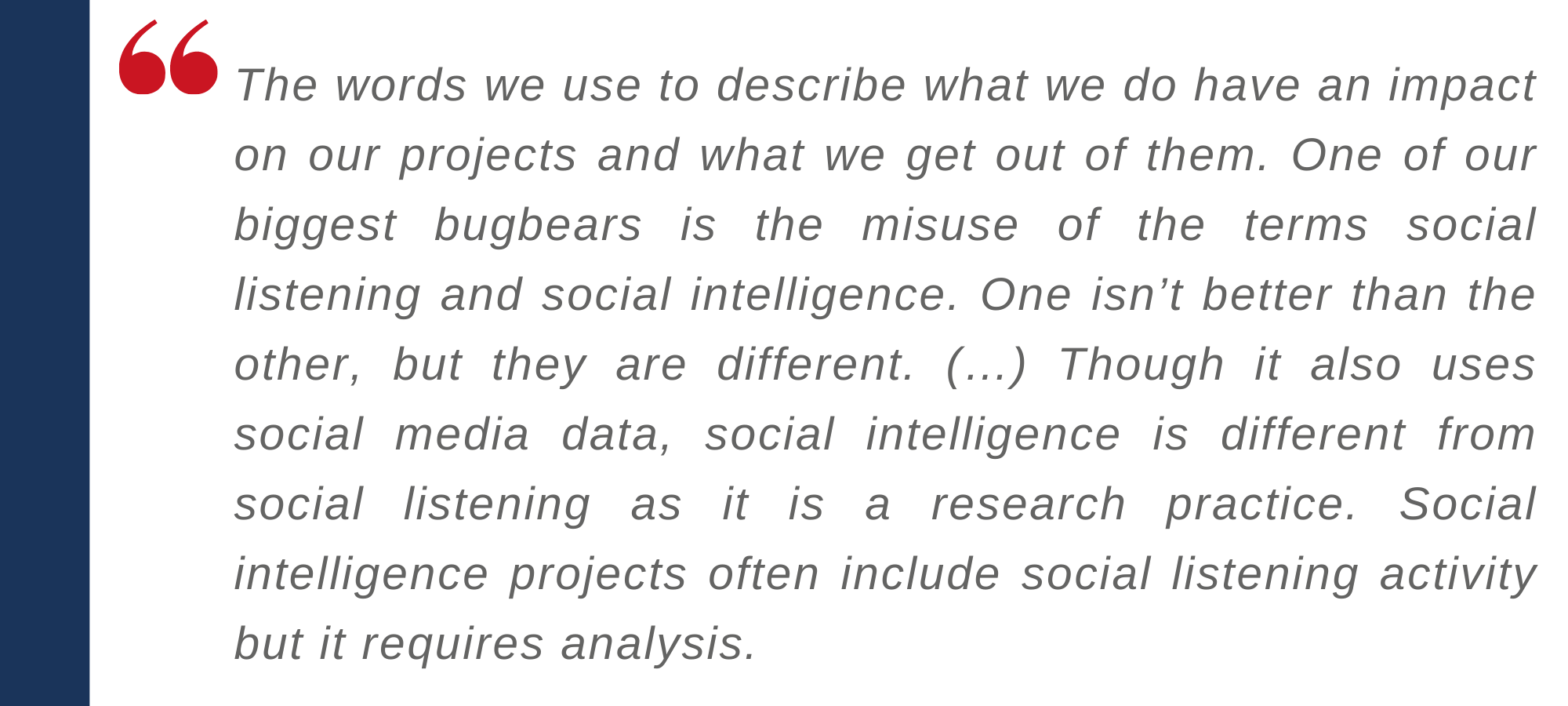The BLOG
This blog provides exclusive content for market researchers and marketing managers involved in Healthcare Marketing, prepared by APLUSA teams, and includes APLUSA important news updates.
Social Media Listening, Intelligence, Monitoring; What difference does it make?
Social data analytics, social media research, online market research, social media listening, social media intelligence, digital market research and more recently consumer intelligence, those are only some of the terms used to describe social media analysis.

Maybe a representation of the dynamic, fast paced and ever evolving nature of the digital space, the tracking and analysing of online conversations has evolved and transformed over the years. You might understandably feel lost at times, especially when venturing in an online search, trying to clarify what-is-what, can yield vastly different and sometimes contradictory definitions.
When it comes to social media analytics, three terms in particular tend to stick out and are sometimes used interchangeably: Social Media Monitoring, Social Media Listening and Social Media Intelligence. As we will see those have very different meaning and implications; how to be sure to use the correct wording?
1. THE EVOLUTION OF WORDINGS
For those who have tried, I am sure navigating all of this has been, at the very least, a confusing experience. I know first hand that it is sometimes tough to convey. But fret not! I am here to help. Let’s first look at why there is such a variety of terms to define social media analytics. Well, part of it is that truly different ways co-exist to look at the data, depending on the goal you want to achieve as we will see. But it has also a lot to do with the social listening platforms themselves, the technology behind having dominated this space from the beginning of social data analysis. Listening platforms have a role in defining it in line with advancement in technology and capacity. With this evolving all the time, so was the need to find terminology to match – and perhaps to better convey – its use.
Giles Palmer CEO Palmer(1) sums it up well:

Social media monitoring
So, I want to start with social media monitoring. It harkens back to the very beginning of the first modern social networks such as Facebook and Twitter. This is when for example a social media listening tool like Brandwatch first appeared in 2005. For reference Facebook was created in 2004 and Twitter was created in 2006. This illustrates again how some form of surveillance of those networks have been there since the very beginning and go hand in hand in the social media ecosphere.
Social media monitoring is more of a reactive process as part of a marketing department. At this stage, any analyses done are focused on a brand own channel, collecting metrics to gauge engagement (volume of brand mentions for example). While this offers useful insights for content managers to monitor marketing campaigns performance, in terms of market research it is a superficial way at looking at social data.
Social media listening
Closely related, social media listening is a step up from social media monitoring. We, as Social Media Analysts, started looking a little more beyond metrics into the deeper meaning behind the information that was being tracked. This with the aim to understand more clearly an audience. Social media listening involves using tools such as sentiment analysis, identifying influencers and analysing the content of individual social media mentions. At this point, company stopped looking inwards and started having a broader view of what social media and social networks could provide not only for their own brands but also as an opportunity to glean insights into an audience at large or a competitor. However, the insights retrieved still rely heavily on quantifiable metrics presented in dashboards via social media listening tools for the most part.

Social media intelligence
Social media intelligence - often confused with social media listening - is actually something rather different. It is the use of social media (and other online sources) to answer a specific business question. It is therefore different in intention and broader in scope than social media listening as it can be considered a proper research practice. Like any market research study you’ll want to start with a business question to answer with the goal of resolving a problem leading into actionable insights. And can be of use to business function such as market research, marketing, or communication whereas social media monitoring and listening mainly sit within a marketing function as we saw previously.
2. CONFUSION REMAINS
On the difference between social media listening and social media intelligence, Dr Jillian Ney(2), founder of the Social Intelligence Lab sums it up nicely by noting:

Dr Jillian Ney also notes on the importance of differentiating between social media listening and social media intelligence:

Yet, confusion may remain when reading current definitions explained from various sources:
For example: in their Social Media certification course the HubSpot Academy(3) defines social media monitoring as aiming “to measure more broadly what the market is saying, not just about you, but about the problem your company solves and the topics your customers care about.” …while another article on the HubSpot platform defines it as “identifying and responding to mentions of your brand on social media via comments, direct messages, and more.” For one SMM is focused on brand tracking while for the other it is broader in use.
This illustrates how important to name concepts appropriately to adequately convey value. And always check definitions with the people you are talking to. Don’t take nothing for granted.
3. WHY DOES IT MATTER?
Why does it matter to use one term or the other? There is no real right or wrong. But you need to check that you are on the same page when working in collaboration on social media “surveillance” projects. As market researchers, it has always been in our DNA to observe behaviours to understand and predict market evolutions. Whatever you call the research tool, the Social Media offer new investigation areas.
4. OUR EXPERT VIEW
At AplusA we conduct projects and use social data in ways that pertain to those three related but different practices. This is not to say that one is better to the other but to highlight their differences and to make sure to understand clearly where they sit in terms of results.
I have for example conducted social listening projects whose aim where to follow the aftermath of a marketing campaign or again the launch of a new product. Social media listening was clearly the most adapted methodology to conduct those projects where KPI were used to gauge engagement online via volume of mention and monitor reaction such as sharing, likes and dislikes. As well as having a broad view of the conversations generated or not.
However social media intelligence is naturally where our focus is directed when it comes to social media analytics. Projects conducted there showed that it is a formidable way to gain insights into the thoughts and emotional journey of patients in particular by going beyond dashboards and conducting deep dive qualitative analysis to contextualise and inform questions.
AND YOU?
How do you name social media analytics? Have you ever been confused by the different terminologies used?
Sources:
(1) Giles Palmer, founder and CEO of Brandwatch | How social listening platforms have evolved through consolidation
(2) Jillian Ney – The Social Intelligence Lab | The Difference Between Social Listening and Social Intelligence
(3) HubSpot Academy - Social Media marketing certification course
If you want to read more on this topic, here are interesting links that we put together for you:
Talkwaker | Guide | What is social media listening & why is it important?
G2.com | Social Media Monitoring: How to Listen to Your Audience
Hootsuite | What is Social Listening, Why it Matters, and 10 Tools to Make it Easier
Brandwatch | What is Social Media Intelligence?
Brandwatch | The Complete Social Listening Guide
It was realised afterwards that social media presented an opportunity to gain deeper insights into the needs and wants of online users. This particularly owning to the unprompted nature of conversations that take place online thus providing a unique window in their needs and wants and beyond that what matters most to them.
This led to what is called social media intelligence which is the application of social data to answer a specific question.
We have conducted listening project for example to follow the aftermath of a marketing campaign and offering insights into metrics such as volume of mentions and word cloud. While this informed of the impact of the campaign, it missed deeper insights provided by a social media intelligence analysis. In contrast to social media intelligence applied to patient journey in particular yield interesting insight that are complimentary to other research methods. This is not necessarily a bad thing but it just illustrates how differently social data can be used.

